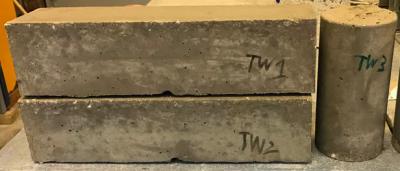Researchers from the University of Exeter have developed a new technique that incorporates graphene into traditional concrete production, to make more than twice as strong and four times more water resistant than existing concretes. The new graphene-reinforced concrete material also drastically reduced the carbon footprint of conventional concrete production methods, making it more sustainable and environmentally friendly.

All of the concrete samples tested have reportedly met British and European standards for construction. The research team states that the new technique could pave the way for other nano-materials to be incorporated into concrete, and so further modernize the construction industry worldwide.
In this new study, the research team has created a new technique that centers on suspending atomically thin graphene in water with high yield and no defects, low cost and compatible with modern, large scale manufacturing requirements.
When tested, the graphene-enhanced concrete was found to have a 146% increase in compressive strength as compared to regular concrete, a 79.5% increase in flexural strength, and a decrease in water permeability of almost 400%. Additionally, the inclusion of graphene in the concrete reportedly allows for a reduction of about 50% of other materials used, including cement. The scientists state that this factor should result in a 446 kg/tonne reduction in emitted CO2.
Dimitar Dimov, the lead author and also from the University of Exeter added: "This ground-breaking research is important as it can be applied to large-scale manufacturing and construction. The industry has to be modernized by incorporating not only off-site manufacturing, but innovative new materials as well.
"Finding greener ways to build is a crucial step forward in reducing carbon emissions around the world and so help protect our environment as much as possible. It is the first step, but a crucial step in the right direction to make a more sustainable construction industry for the future."
In May 2017, Australia-based technology minerals company, Talga Resources, announced impressive initial concrete prototype strength results from trials undertaken at the commercial concrete/cement laboratory of Betotech Baustofflabor in Germany. In that same month, Zenyatta Ventures announced that the next phase to test a graphene-enhanced concrete admixture is progressing through their Collaboration Agreement with Larisplast, an Israeli business that specializes in the field of concrete admixtures.



